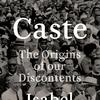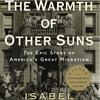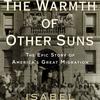Isabel Wilkerson appears in the following:
Isabel Wilkerson's 'Caste: The Origins of Our Discontents'
Thursday, December 31, 2020
Isabel Wilkerson on 'Caste'
Thursday, August 13, 2020
America's 'Caste' System
Thursday, August 06, 2020
With Juneteenth, America Can Shine a Light on Its Dark Past
Monday, June 19, 2017
Books That Changed My Mind: History
Thursday, November 13, 2014
Has the Case of Trayvon Martin made Sanford the New Birmingham?
Tuesday, April 03, 2012
The Great Migration
Thursday, November 24, 2011
Pulitzer Prize-winning journalist, Isabel Wilkerson, talks about her book, now in paperback, The Warmth of Other Suns: The Epic Story of America's Great Migration, as listeners share their families' stories of moving away from the Jim Crow south.
The Great Migration
Thursday, October 06, 2011
Pulitzer Prize-winning journalist Isabel Wilkerson, talks about her book, now in paperback, The Warmth of Other Suns: The Epic Story of America's Great Migration, as listeners share their families' stories of moving away from the Jim Crow south.
Event: Isabel Wilkerson will be speaking tonight at 6:30 at the Tenement Museum. RSVP here.
Census Reveals Great Reversal of 'Great Migration'
Friday, March 25, 2011
The latest Census confirms that once-segregated Southern cities like Atlanta, Dallas, Houston and Miami are luring African Americans from northern metro areas like New York and Chicago. Today, 57 percent of the nation’s black population now lives in the South, which is the highest it's been since 1960. Why are we witnessing a Great Reversal of the Great Migration? For the answer we speak with Isabel Wilkerson, Pulitzer Prize-winning journalist and author of “The Warmth of Other Suns: the Epic Story of America’s Great Migration.”
Tales from 'The Great Migration'
Thursday, November 25, 2010
The massive migration of black Americans from the South to the North in the early part of last century changed the social and cultural landscape of America forever. Six million African Americans eventually left the South around 1920. Before then, 90 percent of all African Americans lived in the south. By 1970, nearly half lived elsewhere in the country.
Isabel Wilkerson on The Warmth of Other Suns
Monday, November 08, 2010
Pulitzer Prize winning author Isabel Wilkerson chronicles one of the great untold stories of American history: the decades-long migration of black citizens, who fled the South for northern and western cities in search of a better life. In The Warmth of Other Suns: The Epic Story of America's Great Migration, she tells this story through the lives of three individuals, and examines how the migration changed the face of America.
The Warmth of Other Suns
Wednesday, September 29, 2010
Pulitzer Prize winning author Isabel Wilkerson chronicles one of the great untold stories of American history: the decades-long migration of black citizens, who fled the South for northern and western cities in search of a better life. In The Warmth of Other Suns: The Epic Story of America's Great Migration, she tells this story through the lives of three individuals, and examines how the migration changed the face of America.
An Oral History of the Great Migration
Wednesday, September 15, 2010
The massive migration of black Americans from the South to the North in the early part of last century changed the social and cultural landscape of America forever. Six million African Americans eventually left the South around 1920. Before then, 90 percent of all African Americans lived in the south. By 1970, nearly half lived elsewhere in the country.
We're asking our African American listeners: Does your family have a story about the Great Migration? If so, we'd love to hear it: When did your family come north? Why did they leave the South? Tell us your story...
Excerpt: 'The Warmth of Other Suns'
Wednesday, September 15, 2010


Chapter 1
1
Chickasaw County, Mississippi, Late October 1937
Ida Mae Brandon Gladney
The night clouds were closing in on the salt licks east of the oxbow lakes along the folds in the earth beyond the Yalobusha River. The cotton was at last cleared from the field. Ida Mae tried now to get the children ready and to gather the clothes and quilts and somehow keep her mind off the churning within her. She had sold off the turkeys and doled out in secret the old stools, the wash pots, the tin tub, the bed pallets. Her husband was settling with Mr. Edd over the worth of a year’s labor, and she did not know what would come of it. None of them had been on a train before—not unless you counted the clattering local from Bacon Switch to Okolona, where, “by the time you sit down, you there,” as Ida Mae put it. None of them had been out of Mississippi. Or Chickasaw County, for that matter.








